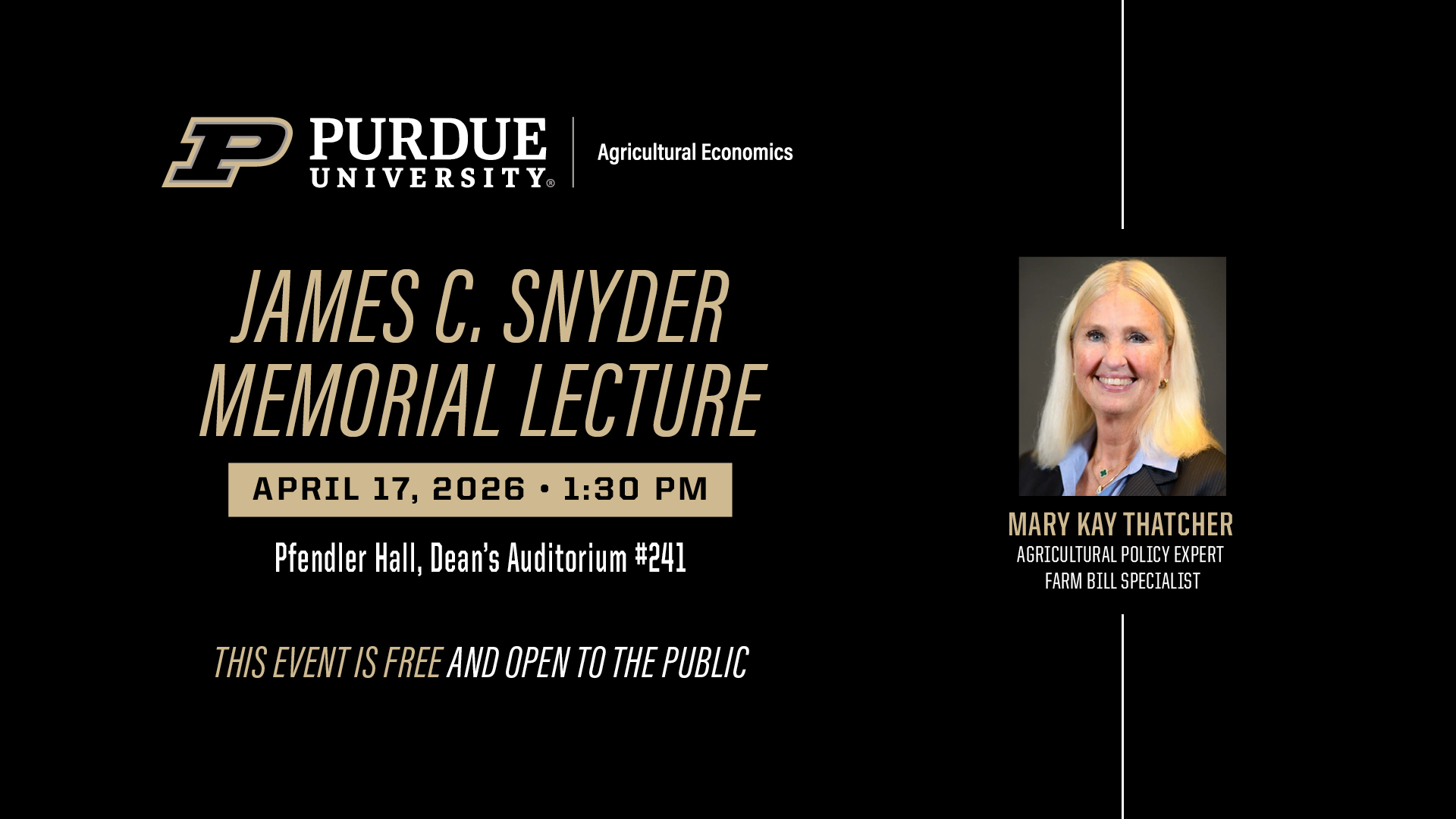
James C. Snyder Memorial Lecture
Friday, April 17, 2026 at 1:30 pm EDT
Pfendler Hall, Dean's Auditorium (Room # 241)
Guest Lecturer: Mary Kay Thatcher
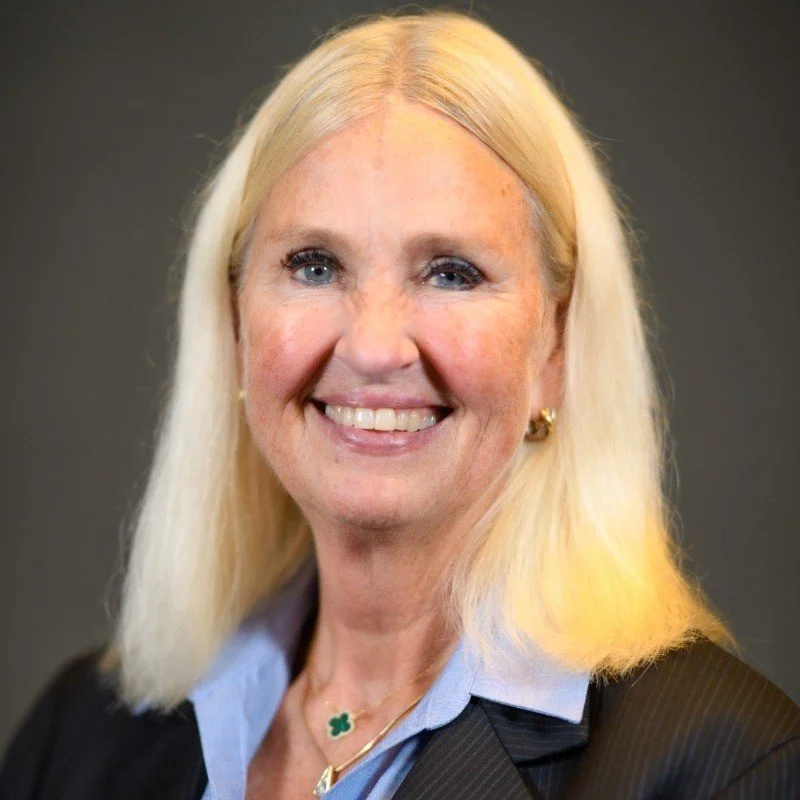 Throughout her career, Mary Kay Thatcher has served in key positions at the American Farm Bureau Federation, Farm Credit Administration, on Capitol Hill and at Syngenta, always with a focus on crop insurance, conservation initiatives and farm safety net programs. Since 1981, she has been instrumental in shaping nine Farm Bills, developing legislation like the Agricultural Credit Act of 1987, enhancing crop insurance programs and establishing agricultural data privacy standards. Stay tuned for the topic of the 2026 James C. Snyder Memorial Lecture.
Throughout her career, Mary Kay Thatcher has served in key positions at the American Farm Bureau Federation, Farm Credit Administration, on Capitol Hill and at Syngenta, always with a focus on crop insurance, conservation initiatives and farm safety net programs. Since 1981, she has been instrumental in shaping nine Farm Bills, developing legislation like the Agricultural Credit Act of 1987, enhancing crop insurance programs and establishing agricultural data privacy standards. Stay tuned for the topic of the 2026 James C. Snyder Memorial Lecture.
Her expertise spans crop insurance policy, conservation programs, farm credit systems, trade negotiations and the legislative process itself. She has delivered hundreds of presentations on topics ranging from pesticide regulation to trade policy, and she has represented U.S. agriculture at international conferences and World Trade Organization negotiations.
Her career began in 1981 as an Agricultural Legislative Assistant to Senator Roger Jepsen (R-IA) during the drafting of the 1981 Farm Bill.
She currently operates a farm in Iowa, resides in Alexandria, VA, and serves on the following boards: National Association of Wheat Growers, Ag Retailers Association and National Association of Farm Broadcasters Foundation.
The event is free and open to the public. For additional information about the speaker and schedule of events, please click on the drop-down menus below. For questions related to the event, please contact Tracy Buck at tbuck08@purdue.edu or 765-494-4191.
2026 SNYDER EVENT INFORMATION
Schedule of Events*
- 1:30 pm - 3 pm, Pfendler Hall, Dean’s Auditorium, Room 241
- Snyder Lecture
- 3 pm - 4:00 pm, Leopold’s Landing
- Department reception
*Additional details for the day will be added as the event gets closer.
About Mary Kay Thatcher
Growing up on a 500-acre Iowa farm, Mary Kay Thatcher was bound for a life and career in agriculture. After graduating from Iowa State University with degrees in animal science and agricultural economics, Mary Kay began her career as a legislative assistant for agriculture and trade to Iowa Senator Roger Jepsen. She then served in the first Bush Administration as a political appointee, as the Director of Congressional and Public Affairs of the Farm Credit Administration, where she was responsible for the policy direction and management of the Agency’s congressional and public affairs activities.
As a lobbyist for the American Farm Bureau Federation for 31 years, she lobbied primarily on issues covering farm programs, crop insurance, conservation and credit. During her tenure at the American Farm Bureau, Mary Kay also spearheaded the organization’s participation in farm data, security and privacy. She served as President of the Ag Data Transparency Evaluator, a tool developed by ag tech providers and farm/commodity groups to help farmers understand the contracts they sign to share their farm data. Mary Kay also served as Secretary of the Ag Data Coalition, a group of 14 members consisting of farm groups, land grant universities, ag equipment manufacturers and technology companies and providers.
Mary Kay spent seven years as Sr. Manager of Federal Government and Industry Relations for Syngenta. She now serves as President of MK Thatcher Consulting, a business specializing in guidance on ag policy or regulations, as well as speaking on how national policy affects agriculture.
A fifth-generation farmer, Mary Kay helps operate her family farm, which produces corn, soybeans and a cow/calf operation.
 Brent Bible (B.S. '98, Agricultural Economics)
Brent Bible (B.S. '98, Agricultural Economics)
Brent Bible was raised on a small farm in west central Indiana and attended Purdue University, where he graduated in 1998 with a Bachelor of Science in agricultural economics. In 1995, he joined the Indiana State Police as a trooper, retiring as a captain. His last assignment included overseeing the commercial vehicle enforcement division, coordinating federal motor carrier safety initiatives with state enforcement efforts. He is currently a managing partner and owner of Stillwater Farms, a production agriculture farming operation with a $4.5 million annual budget that concentrates on seed production for Beck’s Hybrids.
He has served in several volunteer capacities at Purdue and the broader community, including currently serving on the Fraternity, Sorority and Cooperative Life Advisory Board, Grand Prix Foundation advisor, Purdue Farm Policy Study Group, Purdue FarmHouse Foundation Board of Directors, Farmhouse Fraternity advisor (25 years and counting), and Top Producer Advisory Panel for the Environmental Defense Fund. Past board positions include the Purdue College of Agriculture Dean’s Advisory Board, the President’s Council Advisory Board, the International Farmhouse Foundation Board of Trustees, the president of the International Executive Board for Farmhouse Fraternity and treasurer of the Stockwell United Methodist Church.
Brent was elected to the Board of Directors for Tipmont REMC in 2008, a rural electric cooperative, and currently serves as chairman of the board. Responsibilities include overseeing a $250 million plant with a $100 million annual budget.
In several of these professional and volunteer capacities, he has had opportunities to work with state and national legislative and administrative officials to advocate for or assist in shaping public safety, agriculture, higher education and rural development policy.
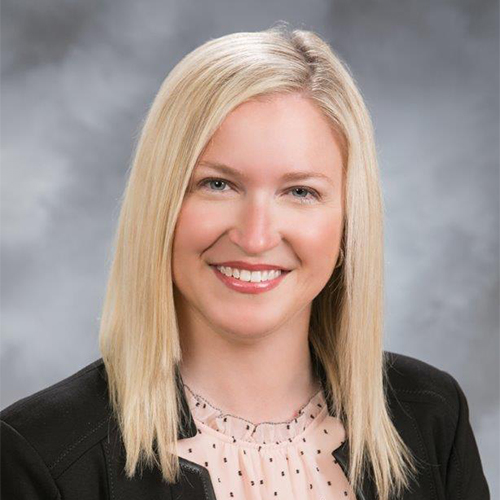 Chrissie Cartmell Loucks (B.S. ’07, agribusiness management)
Chrissie Cartmell Loucks (B.S. ’07, agribusiness management)
Chrissie Loucks is the portfolio manager for digital aftermarket products at John Deere. She began her career with the company immediately after graduating from Purdue University and has spent nearly 18 years in roles of increasing responsibility. Throughout her tenure, she has served as a territory manager supporting John Deere dealers in Southwest Iowa, a product planner for air seeding and tillage equipment and a product marketing representative for precision ag products. She has also led teams as the division aftermarket sales manager for the Midwest states and as manager of dealer success.
A 2007 graduate of Purdue University, Chrissie earned a B.S. in agribusiness management. During her time at Purdue, she was actively involved in leadership and service, including serving as vice chief justice of the Purdue Student Supreme Court, Grand Prix senior board director of business and risk management class representative for Alpha Chi Omega sorority. She was also engaged in Indiana agriculture, participating in the Indiana Junior Angus Association and co-advising the Indiana Junior Beef Cattle Association.
Today, Chrissie remains deeply connected to Purdue and the agricultural community. She serves on the Purdue Ag Alumni Trust Fund Board, sponsors an annual scholarship for deserving agricultural economics students and leads John Deere’s marketing and customer support team’s recruitment efforts at the Purdue College of Agriculture.
Originally from Monticello, IN, Chrissie grew up on a grain and livestock farm, where her family continues to farm today. She and her husband currently reside in Osceola, IN. When she’s not working, you can find her helping on the farm, supporting 4-H youth, traveling or cheering on Boilermaker basketball!
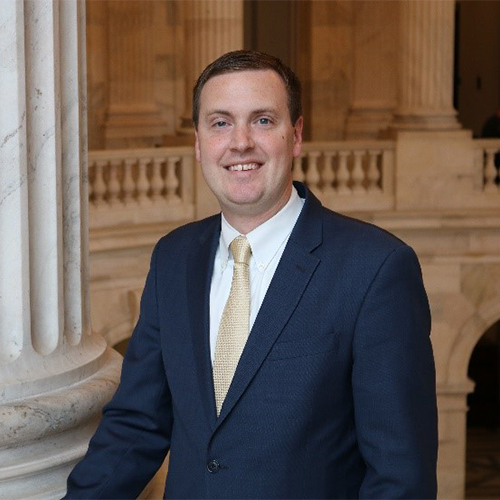 Matt Erickson (B.S. '08 and M.S. '10, agricultural economics)
Matt Erickson (B.S. '08 and M.S. '10, agricultural economics)
Matt Erickson is currently the agriculture economic and policy advisor for AgCountry Farm Credit Services, Farm Credit Services of America and Frontier Farm Credit. In this role, he provides valuable perspectives, insights and commentary that connect conditions in the agricultural economy to individual producer impacts and their resulting effects on the organization.
Before joining Farm Credit, Matt served as chief economist at the United States Senate Committee on Agriculture, Nutrition and Forestry under the leadership of former Chairman Pat Roberts (R-KS). In this capacity, he managed the committee’s work on budget, economic and policy analysis, advising the chairman and other committee members on the status of the agricultural economy, commodity markets and economic impacts related to the committee’s legislative priorities. He also led policy initiatives on commodities, crop insurance, dairy and grain standards, contributing to significant legislation such as the 2018 Farm Bill, the United States Grain Standards Reauthorization Act of 2020 and multiple COVID-19 relief measures, including The Coronavirus Aid, Relief, and Economic Security (CARES) Act and the Consolidated Appropriations Act of 2021.
Prior to his tenure at the United States Senate Agriculture Committee, Matt worked as an economist at the American Farm Bureau Federation and at the United States Department of Agriculture under President George W. Bush.
Matt earned a Bachelor of Science (May 2008) and a Master of Science (August 2010) in agricultural economics from Purdue University. He remains actively involved in his family farm in Brookston, Indiana, and contributes to the community. He helped start a Sleep in Heavenly Peace Chapter, where community volunteers build beds for children in need.
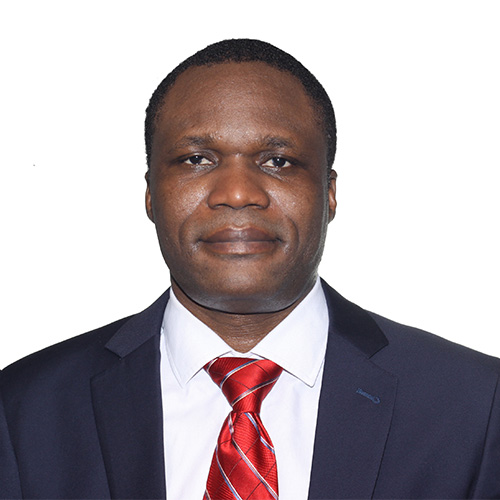 Valerien Pede (Ph.d. '09, Agricultural Economics)
Valerien Pede (Ph.d. '09, Agricultural Economics)
Dr. Valerien Pede is a senior agricultural economist at the International Rice Research Institute (IRRI), where he currently leads the transformative policies and investments unit. He holds a Ph.D. in agricultural economics from Purdue University (2009) and an M.S. from the University of Arkansas (2005). With a strong foundation in economic theory and empirical analysis, Dr. Pede’s research spans a diverse array of topics critical to sustainable agricultural development.
His work includes applied spatial econometrics, regional analysis and impact evaluation of agricultural technologies, focusing on their role in improving food security, reducing poverty and fostering inclusive growth. Dr. Pede’s expertise also covers commodity price dynamics, climate change and the development of foresight and policy frameworks aimed at navigating complex agricultural challenges.
As a researcher and policy advisor, Dr. Pede strives to generate evidence-based solutions that inform policy decisions and investments to enhance the resilience of agricultural systems. He is particularly focused on how innovations in rice production and other agricultural technologies can lead to tangible improvements in the livelihoods of smallholder farmers while also contributing to broader food security goals. His work has had a significant impact on shaping policies that support sustainable agricultural practices, climate adaptation strategies and poverty reduction in rural communities.
At IRRI, Dr. Pede continues to work at the intersection of research, policy and investment, ensuring that economic insights and data-driven solutions guide the development of effective agricultural strategies for the future.
HISTORY OF THE SNYDER MEMORIAL LECTURE
History of the Lecture
The James C. Snyder Memorial Lecture is the Department of Agricultural Economics’ signature event at Purdue University. The lectures were established in February 1975 as an appropriate memorial to a distinguished member of the faculty. Funds are contributed by friends and corporations who wish to encourage the continuation of Jim Snyder’s professional efforts during his brief but brilliant career. As a highlight, a top professional in agricultural business and economics, or related areas, is brought to the campus to give a lecture and interact with staff and students. The Memorial Lecture, of general interest to all Department professional staff and students, is the high point of the visit. The lecture is open to the public with selected professionals invited as special guests.
Purpose
-
- Stimulate the intellectual environment of the Department for more creative research, teaching, Extension, and international activities.
- Recognize the professional contributions of Professor James Snyder in pioneering undergraduate curriculum in agricultural business management, and in the development and application of quantitative techniques for agribusiness research and training of graduates
- Contribute to the Department’s efforts to enhance and motivate excellence in all of its mission areas by bringing to the Purdue campus individuals who can offer unique contributions
- Broaden the perspective of students by exposing them to outstanding professionals from other institutions, and close interaction both within structured situations and informal settings.
- Assist the faculty on specific assignments.
Previous Snyder Lecturers
-
- Rob Dongoski, 2024
- Jay T. Akridge, 2023 - working paper from Akridge's lecture
- John List, 2022
- Joe Balagtas, Ted McKinney, Matt Erickson, and Rob Johansson, 2021 - recording
- Beth Ford, 2020 - recording
- Jayson Lusk, 2019
- Keith Coble, 2018
- Daniel A. Sumner, 2017
- Robert L. Thompson, 2016
- Helen Jensen, 2015
- J.B. Penn, 2014
- Robert B. Zoellich, 2013
- Rob Paarlberg, 2012
- Thomas Hoenig, 2011
- Ian Sheldon, 2010
- Brian Wright, 2009
- Scott Irwin, 2008
- Jason Shogren 2007
- Zoltan Acs, 2006
- David Downey, 2005
- Douglas Hedley, 2004
- Susan Offutt, 2003
- Victor Davis Hanson, 2002
About James C. Snyder
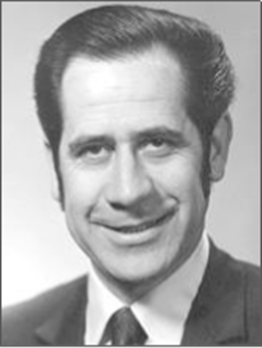
This lecture series is dedicated to the memory and legacy of Dr. James C. Snyder, a Purdue Agricultural Economics graduate (M.S., 1956; Ph.D. 1962) and member of the faculty until his passing in 1974 at the age of 44 – much, much too soon. Although his time with us was brief, James' brilliant career exemplified the very best of a land-grant faculty member.
Professor Snyder was a gifted researcher and his talent was recognized early on when he became the first Purdue student to receive the Ph.D. thesis award from the American Farm Economic Association (now Agricultural and Applied Economics Association).1 He is primarily known for his work bringing sophisticated tools of quantitative analysis, especially operations research techniques, to the managerial problems of food and agribusiness firms. This work was wide-ranging and included applications from feed manufacturing (least cost formulation and inventory management) to ice cream and sausage production (cost and quality production control).
In a 1958 review paper published in Operations Research, Snyder and his co-authors were prescient in their discussion of the growing size and complexity of management problems in rapidly expanding food and agribusiness firms and the equally dramatic expansion of data available to help solve such problems – perhaps even foreshadowing uses of artificial intelligence.2 These many contributions in the application of computing to address management problems led Purdue to name one of its high-performance computing clusters ‘Snyder’ in 2015 (the cluster was retired in 2021).
His work was not limited to research applications of quantitative tools and he had a robust Extension program. Professor Snyder’s applied research and Extension publications encompassed such topics as cost analysis for small commercial banks, surveys on seed corn marketing practices, and in one extension publication, an important problem of food retailers at the time: what to do with empty bottles.3 Another dimension of his industry engagement was the consulting firm, Snyder Associates, that he owned and operated. While deep relationships with industry were a hallmark of his research and Extension activities, Professor Snyder also made disciplinary and methodological contributions to the field with multiple Journal of Farm Economics/American Journal of Agricultural Economics articles and a contribution to Econometrica in 1970: “A Decomposition Algorithm for Solving the Multi-Facility Production Transportation Problem with Non-Linear Production Costs”.4
Professor Snyder was widely recognized for his exceptional teaching at both the graduate and undergraduate levels. At the graduate level, under his personalized and rigorous mentorship, students revered him, excelled, and took leading positions in business, education, and government.1 He was recognized as ‘teacher of the year’ for his outstanding undergraduate instruction in business management1 and was deeply involved in developing the undergraduate curriculum in agribusiness management. In a 1969 proceedings paper published in the American Journal of Agricultural Economics, “Trials, Errors, and Successes in Agribusiness Education at Purdue”, he defined the Department’s overall goals for an undergraduate curriculum in agribusiness:5
- A broad and liberal education in the social and natural sciences.
- Adequate professional emphasis to enhance student placement and performance with business firms upon graduation.
- Adequate academic emphasis to provide the foundation for graduate work in business management and/or economics.
- Adequate agribusiness emphasis to provide the student with special insights into the unique problems of agribusiness without becoming involved in specific trade practices and problems of any one activity.
One can easily argue these four goals should be the foundation for a curriculum in food and agribusiness management today.
Professor Snyder was an accomplished researcher, deeply involved with industry, a master teacher, and someone who fully leveraged his engagement in all three land-grant mission areas. He will always be remembered as a brilliant colleague whose work, standards and style are an inspiration to those following in his footsteps at Purdue University. We hope to encourage the legacy of farming, the importance of research and emerging technologies, as well as the networking of ideas and strategies with future James C. Snyder Memorial Lectures.
References
- Snyder Biography: J.C. Snyder, snyder-james-c.pdf (purdue.edu).
- French, C.E., M.M. Snodgrass, and J.C. Snyder. Application of Operations Research in Farm Operations and Agricultural Marketing. Operations Research, Vol. 6, No.5 (Sep-Oct 1958) pp. 766-77. https://www.jstor.org/stable/166901?sid=primo&seq=7.
- Baker, G.L and J.C. Snyder, Bottle Returns. Mimeo EC, no. 187 (Aug. 1959) - Extension Mimeo EC (Purdue University. Agricultural Extension Service) - Purdue e-Archives.
- Sharp, J. F.; Snyder, J.C.; and J.H. Greene. Econometrica, 1970, Vol.38 (3), p.490-506, A Decomposition Algorithm for Solving the Multifacility Production-Transportation Problem with Nonlinear Production Costs.
- Snyder, J.C. Trials, Errors, and Successes in Agribusiness Education at Purdue. American Journal of Agricultural Economics, Vol.51, No. 5 (Dec. 1969), pp 1218-1221. https://www.jstor.org/stable/1237991?sid=primo%3Fsid%3Dprimo.
